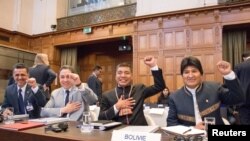Bolivian President Evo Morales arrived in The Hague on Monday to petition the World Court to force Chile to grant his land-locked country direct access to the Pacific Ocean, in a dispute between the Andean neighbors that dates back decades.
Bolivia has asked the court, formally known as the International Court of Justice, to order its Latin American neighbor Chile to enter negotiations on the issue, over which it filed a lawsuit in 2013.
Bolivia, which lost former coastal territory during a war in the 19th century, argues that Chile has not kept later diplomatic promises and obligations under international law to negotiate over "sovereign access" — possibly in the form of a land corridor and a port under its control.
But in opening arguments, Bolivian lawyers said the country was not asking "the court to rule on how sovereign access should be arranged... but simply [to ensure] that Chile return to the negotiating table in good faith."
"For 150 years Bolivia has suffered the historical injustice of being landlocked," said lawyer Eduardo Rodriguez Veltze, adding that Chile had made many promises "to reconnect Bolivia to the sea."
Chile's Foreign Minister Roberto Ampuero told journalists outside the court that the Bovilian testimony "made a lot of references to history but did not have much accompanying elaboration on legal matters."
He said Chile would present a more "realistic" view of the current situation in its formal response, due to begin on Thursday.
Small groups of Bolivians and Chileans staged rival demonstrations outside the court, playing music and waving their national flags.
Bolivia has commercial access to the Pacific via Chilean ports, but must pay fees. Chile argues that the matter was settled by the 1904 peace treaty struck after the War of the Pacific, which fixed current boundaries.
In 2015, the court found it had jurisdiction in the case, despite Chilean opposition.
Bolivia, which still retains a navy, wants a corridor to the sea to boost its exports of natural gas and minerals. Chile argues Bolivia already has access on favorable terms.
Oral arguments run through March 28. Then judges will deliberate for several months before setting the date for a ruling.
The International Court of Justice is the United Nations' highest court for disputes between nations. Its rulings are binding and cannot be appealed, though countries have occasionally flouted them.











